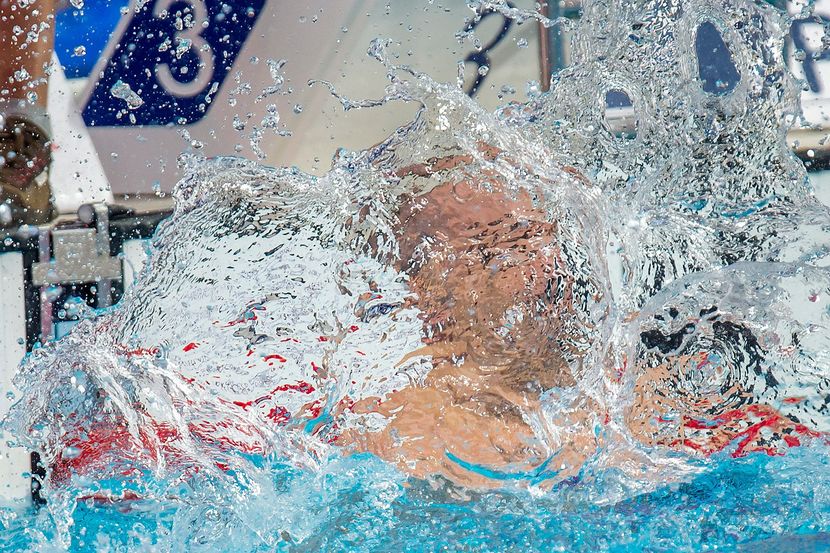
The women’s 200m breaststroke was hard fought. The duel between Russia’s Olga Detenyuk (1993) and Japan’s Keiko Fukudome (1993), both 15 years of age, was thrilling. Eventually the Russian won in 2:25.19, a Championships record, with the Japanese just 0.20 seconds behind, taking the silver medal. Laura Sogar of the United States was third in 2:26.41.
Men's 100 free podium - credit: Satiro Sodré
The men’s 200m backstroke title was conquered by Kiwi Kurt Basset (1990) in a Championships record time of 1:59.67 (improving on his 2:00.19, set during the preliminaries). It was the fifth gold medal for New Zealand (out of five medals won). Basset’s win was clean, with the second and third distanced respectively of little less and little more of a second: Canada’s Matthew Swanston (1991) took the silver in 2:00.53 with Poland’s Radoslaw Kawecki taking the bronze in 2:00.72.
Two Japanese climbed the podium for the women’s 100m butterfly: Natsuki Akiyama (1991), already the winner of 200m butterfly, conquered her second gold medal with the time of 59.58 while Yui Miyamoto (1992) necked the bronze in 1:00.05. In between, the fifteen-year-old Italian Silvia Di Pietro (1993) conquered a bitter silver medal just 0.02 seconds behind Akiyama.
An all-European podium was witnessed in the men’s 1500m freestyle. Krzysztof Pielowski (1991) of Poland won the event in 15:25.01, more than a second ahead of Russia’s Artem Podyakov (1990), 15:26.56. France’s Raoul Shaw (1990) was third in 15:31.07.
Another French swimmer climbed the next podium, this time to the highest place: it was Elodie Schmitt (1992) who dashed the 50m freestyle in 25.88, enough to clinch gold just 0.07 seconds ahead of Hanna Riordan (1991) of Canada. In her turn the Canadian, with 25.95, was 0.06 seconds faster of Nathalie Lindborg (1991) of Sweden who clinched the bronze in 26:01.
In the men’s 200m butterfly the Japanese Yuya Horihata (1990) and Yosuke Mori (1991) emulated what their female homologues had done earlier in the 100m butterfly: both climbed the podium, Horihata in first place, with 1:50.03, Championships record, Mori in third with 1:59.13. Similar to the women’s 100m butterfly podium, an Italian, this time Federico Bussolin (1990) clinched the silver medal in 1:59.32. Bussolin had clocked the fastest preliminaries time with 2:00.01, a short lived Championships record.
The men’s 50m breaststroke was an extremely tight race. All three medallists came in within just three hundredths of a second, indeed an unusual circumstance: the first two, Great Britain’s Daniel Sliwinski (1990) and Serbia’s Caba Siladji were separated by a mere one hundredth of a second: 28.37, and 28.38 their respective times; the third, Italy’s Andrea Toniato conquered the bronze in 28.40: all went under the previous Championships record of 28.42 (set by Siladji in the semi-finals).
USA’s Dagny Knutson (1992) won her fifth gold medal – her third individual – in the 200m freestyle. She took this event in a Championships record of 1:59.78. This victory put the USA on track again for supremacy in the gold medal count. Knutson’s compatriot Samantha Tucker (1991) won the silver medal in 2:00.41, while Australia’s Ellen Fullerton (1992) was third in 2:01.18.
Olga Dementyuk (RUS) - credit: Satiro Sodré
The 6-day long Championships concluded with the two medley relays events.
Great Britain triumphed among the men in 3:41.69, a Championships record, ahead of Japan which narrowly beat the United States for the silver medal: 3:42.61 and 3:42.79 the respective times of the two teams. The British quartet was formed by Chris Walker-Hebborn (56.62), Daniel Sliwinski (1:02.08), James Doolan (52.97) and Robert Bale (50.02).
On the women side, the Japanese quartet of Sayaka Akase, Mina Matsushima, Natsuli Akiyama and Shiori Kaneko suffered a painful disqualification after winning the race due to (the anchor leg) Kaneko’s early start: she had left the podium 0.02 seconds earlier (at these Championships a “zero tolerance” was applied). Victory was then awarded to the United States with the time of 4:06.90 (Pelton 1:03.06, Sogar 1:08.87, Mcelhany 1:00.41, Tucker 54.56), a new Championships record. Australia was second with 4:07.59, narrowly ahead of Canada (4:07.76).
Elena Sokolova (RUS), Dagny Knutson (USA) and Daniel Bell (NZL) were the three best swimmers, with three individual wins (15 points) each. Natsuki Akiyama (JAP), Grace Loh (AUS), Danila Izotov (RUS), Krzysztof Pielowski (POL) and Daniel Sliwinski (GBR) were the other individual multiple winners, with two victories (10 points) each.
The United States were the best team, both in term of medals and in the team rankings resulting from the point system. The USA superiority came mainly from their strong female team which conquered as many as 17 medals out of an overall total of 21, including 8 gold (9), 5 silver (6) and 4 bronze (6). Russia was second (7, 2, 4) while New Zealand, for once ahead of Australia, was third with 5 gold. In terms of total medals Japan was third with 12, Australia and Italy fourth with 10 each. Germany won most silver (7) while Canada took most bronze (6).
Yuya Horihata (JPN) - credit: Satiro Sodré
As for the points, the USA won the Combined Team Scores, with 820.50, ahead of Japan (634), Russia (585), Canada (528.5), Great Britain (431), Germany (402.5), Italy (386), Poland (315.5), Australia (273), France (240), and New Zealand (192).
With the staging of the second edition, at the UANL Swimming complex in Monterrey, Mexico, the FINA World Junior Swimming Championships have definitely taken off by all terms: participation, world representation and excellence of performances.